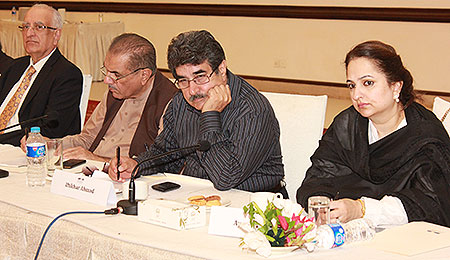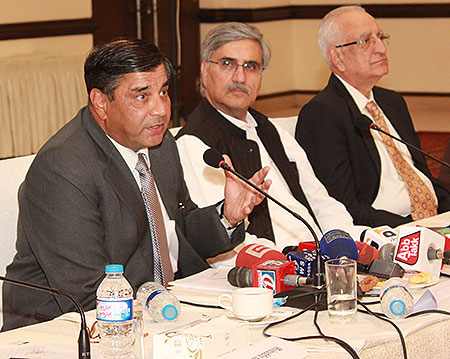| |
August
11; High Commissioner of India to Pakistan, H.E. Dr. T. C. A.
Raghavan, shared his views on Mutual Learning on Governance
and Development between Pakistan and India at the PILDAT
Forum today.
Dr. Raghavan lauded the efforts of PILDAT in the past in the
facilitation of the Parliamentarian Dialogues between Pakistan
and India from 2004 till 2014.
He felt each country had excelled in different areas and hence
could benefit from knowledge sharing. Praising construction
and management of Motorway in Pakistan, Dr. Raghavan said that
both countries had areas to learn from each other. The proactive
use of RTI Law, eradication of Polio, and arid agriculture for
instance, constituted good examples in India.
Dr. Raghavan also believed that each country can look at and
learn from good practices governance in the shortest possible
time. Though he pointed out that for this to materialize the
environment needed to be conducive and there needed to be a
lot of investment in the areas by the governments of both Pakistan
and India. In the current context Dr. Raghavan felt for the
growth of both countries, it was pertinent for Pakistan and
India to increase structured interaction on issues of governance.
While explaining the best practices adopted by countries Dr.
Raghavan spoke about the model example of Singapore. He highlighted
how the government of Singapore had concentrated its efforts
on the improvement of one particular area at a particular time.
Dr. Raghavan also felt that the process of change could not
happen in isolation as the civil society and its pressure on
the government was required for the materialization and implementation
of change. One example that he gave in regards to the importance
of the Civil Society Organizations (CSO) in the development
of the governance structure in India was the involvement of
the CSO�s in the success of Project Tiger, a programme for the
conservation of the tigers of India.
When identifying the channels, which might lead to better governance
structures, he highlighted the importance of the development
of technology and the globalization of the world, which made
knowledge sharing between India and Pakistan and most other
countries accessible. To him the best approach for any country
when considering the development in governance was to look at
model examples and tailor them to their own country.
Guests on the occasion raised questions relating to the scenario
of bilateral relations, Kashmir issue, the tenacity of the Indus
Water Treaty, Indian position on the Pakistan-China Economic
Corridor, the relationship between civil service and Government
in India.
The Luncheon Address was attended by members of the Provincial
Assembly of the Punjab including Ms. Nabila Hakim Ali,
Mr. Viqas Hassan Moakkal, and Dr. Murad
Raas. Other prominent attendees included Mr.
S. M. Zafar, former Senator and Senior Advocate,
Supreme Court and Lt. Gen. (Retd.) Moinuddin
Haider, Former Governor, Sindh and former
Federal Minister for Interior, Ambassador (Retd.)
Shahid Malik, Former High Commissioner of the Pakistan
to India, Mr. Tasneem Noorani, Former
Federal Secretary for Interior, Mr. Imtiaz Alam,
Senior Journalist and General Secretary, South Asian Free
Media Association, Mr. Mujeeb-ur-Rehman Shami,
Editor-in-Chief, Daily Pakistan, Mr. Fakir Syed
Aijazuddin, OBE, FCA; Mr. Iftikhar Ahmad,
Senior Journalist, and senior members of the academia and
the civil society. |
|
| |

(L-R) Mr. Shahid Hamid, Senior Advocate Supreme Court; Mr. Mujeeb-ur-Rehman Shami, Editor-in-Chief, Daily Pakistan; Mr. Iftikhar Ahmad, Senior Journalist, and senior members of the academia and the civil society; Ms. Ayesha Hamid, Senior Advocate, Lahore High Court. |
|
| |

(L-R) The High Commissioner of India to Pakistan, H.E. Dr. T. C. A. Raghavan; Mr. Ahmed Bilal Mehboob, President, Pakistan Institute of Legislative Development and Transparency- PILDAT; Mr. Shahid Hamid, Senior Advocate Supreme Court. |
|